Strategy
Launched and managed by First Trust Advisors L.P. in 2016, the First Trust Nasdaq Bank ETF (NASDAQ:FTXO) invests in stocks of companies operating across the United States banking industry. FTXO invests in growth, value, and volatility stocks across diverse market capitalizations and aims to track and replicate the performance of the Nasdaq US Smart Banks Index. The fund selects and weights its holdings based on a number of factors, including liquidity and volatility. It selects the 30 most liquid banks, along with other financial services companies involved in retail banking, loans, and transactions. The index is rebalanced and reconstituted on a quarterly basis.
Holding Analysis
FTXO focuses on large-cap banking companies in the United States, featuring several prominent names in its top 10 holdings. The fund invests in a total of 49 stocks and allocates just under 62% of its entire portfolio to the top 10 holdings. These holdings have a wide range, with JPMorgan Chase & Co. (JPM) sitting at a weight of nearly 10%, while Discover Financial Services (DFS) has a substantially lower weighting at approximately 3%. The top 15 holdings constitute 75% of the portfolio. Moreover, FTXO invests nearly 74% of its portfolio in large-cap stocks, 21% in mid-cap, and 5% in small-cap holdings.
Seeking Alpha etfdb.com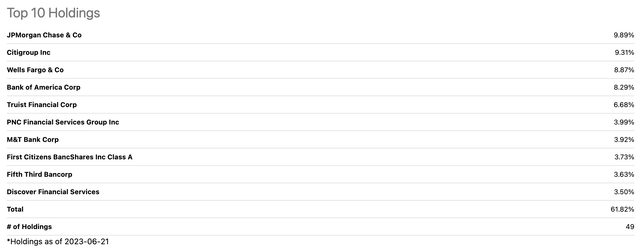
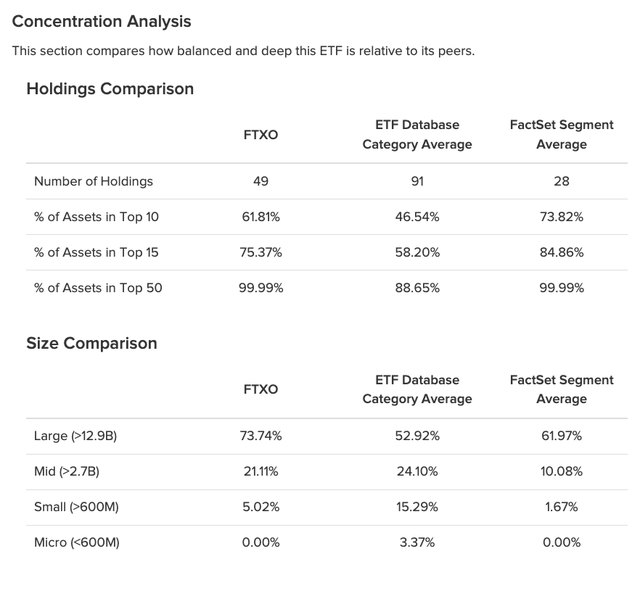
Strengths
One of FTXO’s key strengths is its decently attractive and steady dividend yield. The fund currently has a dividend yield of 3.75%, which is higher than the median of all ETFs at 2.31%. In addition to this, the fund has a high dividend growth rate (TTM) of 30%, which is over double the rate of the median. While the fund only has 1 consecutive year of dividend growth, it has been consistently paying out dividends for the past 5 years, whereas the median is only 2 years. Since the fund was launched in 2016, this means that the fund started paying out dividends just two years after its launch. The fund has also demonstrated strong dividend growth throughout its history of paying dividends, with a CAGR of over 14% in the past 5 years, whereas the median for all ETFs is slightly over 6%.
Seeking Alpha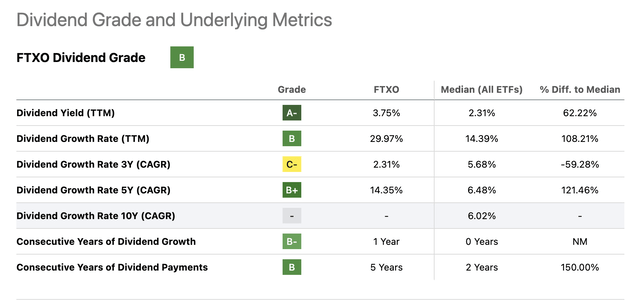
Performance Analysis
When we look at FTXO’s performance in the past year, it is clear that the fund has been able to sustain similar returns to the S&P 500. However, the fund experienced a steep decline in February 2023, from which it has not been able to recover in comparison to the broader index’s total return. Meanwhile, the S&P 500’s total return has been steadily increasing. As of now, FTXO’s total return is down over 18% in the past year, whereas the S&P 500’s return is up over 18%. However, this minor crash can most likely be attributed to the recent bank failures of Silicon Valley Bank and others.
Seeking Alpha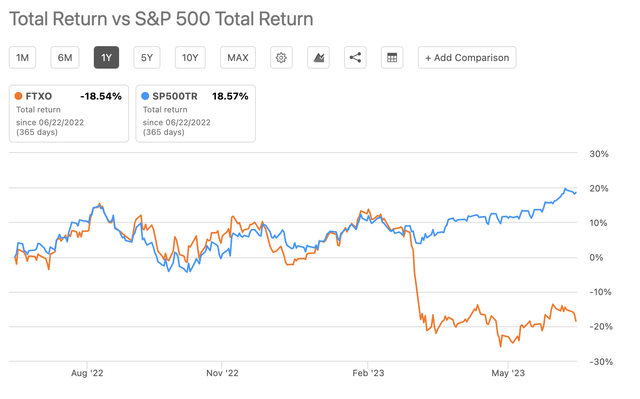
Seeking Alpha assigns FTXO a risk grade of D-, and many of its underlying metrics also fall within the D range. This may be due to the fund’s high concentration risk, as the fund has a high percentage, nearly 62%, of assets in its top 10 holdings. The fund has an extremely high turnover rate at 69%, which is more than double that of the median of all ETFs. This suggests that the fund may be employing a more active management style, where the fund managers are continuously buying and selling securities within the fund to optimize its performance in relation to the broader market. This makes sense considering that the recent crash of a few banks might propel the fund’s managers to reduce their exposure to distressed banks and limit the potential of other banks that may be at risk of falling out. These factors have contributed to the fund’s high annualized volatility at 31%.
Seeking Alpha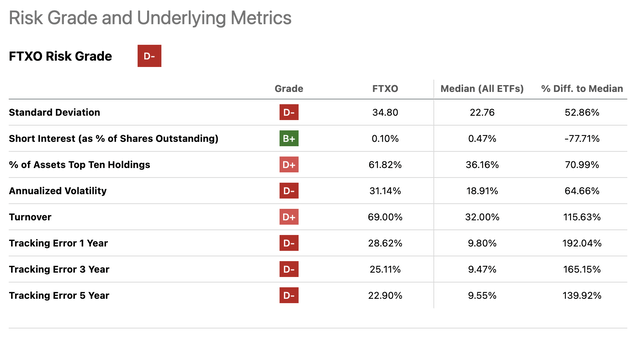
Future Bank Mergers
The banking industry has significant potential for growth as Treasury Secretary Janet Yellen announced that more banks will likely merge this year as interest rates increase. Smaller banks may face more risk as consumers switch over to larger and more established banks in light of the banking crisis in March, following the fallout of Silicon Valley Bank, Signature Bank, First Republic and others. For instance, Silicon Valley Bank depositors are now with First Citizens, Signature Bank depositors are now with Flagstar Bank, and First Republic consumers are now with Chase. Ultimately, this consolidation in the banking industry could be a driver of growth for many large banks, including many of FTXO’s holdings. While larger banks can benefit from this influx of depositors from smaller institutions, there could also be over-concentration in larger banks, which risks creating a less competitive market. Regardless, FTXO stands to benefit from this shift in the banking sector.
Threats
While the potential for increased mergers in the near term serves as a solid upside for larger banks in FTXO’s portfolio, the commercial real estate sector also poses risks for the banking sector. There has been a large number of commercial mortgages are set to expire, and many regulators and analysts are growing more concerned about commercial real estate debt. These properties have mostly lost value in the past few years due to higher interest rates and changes in the way work (shift towards remote work). Moreover, if a property loses value and the loan on it remains the same, the bank can lose that the amount of money lost in value. This year, there is an unprecedented $270 billion in commercial mortgages set to expire, but the high potential for defaults can significantly hurt banks that hold these loans.
Conclusion
Overall, FTXO has demonstrated relatively solid performance in the past year, but the fund did experience a significant downturn in February of 2023, following the failure of several banks in the US, most notably Silicon Valley Bank. Despite this setback, the fund has maintained an attractive dividend yield and dividend growth rate. Its yield and yield growth compare favorably to its closest peers and also outperform the median of all ETFs. Moreover, the fund has demonstrated consistent dividend payouts as well as strong historical growth. However, the ETF is inherently risky with high concentration risk and volatility, and its high turnover rate may likely have been caused by recent market crises. Overall, consumer sentiment towards the banking industry still remains low, and I rate FTXO a Hold, at least until consumers regain confidence in banks.
Read the full article here




